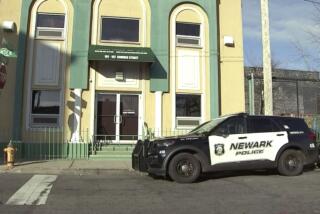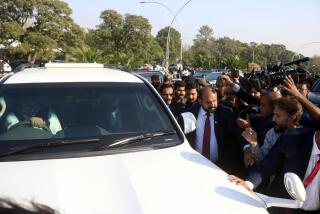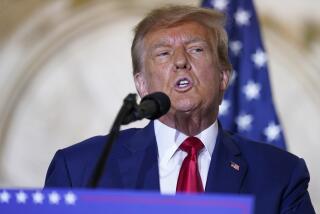Ex-Pakistani Premier’s Lawyer Gunned Down
- Share via
KARACHI, Pakistan — A defense lawyer in the trial of deposed Pakistani Prime Minister Nawaz Sharif was shot to death in his Karachi office Friday, adding a horrible twist to a surreal legal drama.
Iqbal Raad, 52, one of the lead members of Sharif’s large defense team, was gunned down along with two other people when three masked assailants rushed into the office in the commercial heart of this southern port city. The gunmen fired several rounds, ran to a waiting getaway car and escaped.
It was not immediately known whether the killings were related to Sharif’s trial on charges that could bring the death penalty. Police have made no arrests, and no group has claimed responsibility. Associates said Raad had been receiving threats.
The shooting, which occurred while many people in this predominantly Muslim city were attending weekly prayers, came two weeks before a scheduled visit by President Clinton to Pakistan’s capital, Islamabad. Clinton is not scheduled to stop in Karachi.
Police officials in Karachi said they believe that spies from archrival India sponsored the attack. Pakistani authorities often accuse India’s Research and Analysis Wing, or RAW, a state intelligence agency, of acts of terrorism in Pakistan.
“It is a terrorist act and in high probability sponsored by RAW to show Clinton that the law-and-order situation is worsening here,” said Akhtar Hussain Gorchani, Karachi’s acting police chief.
In Washington, White House Press Secretary Joe Lockhart said Clinton has no plans to cancel his visit. “Obviously we condemn this kind of horrific act of violence and call upon them to investigate fully this assassination,” Lockhart said. “We believe the former prime minister deserves a free, open and transparent trial so that he and the rest of the world can see that justice is being done.”
Sharif, deposed in a coup by army officers in October, is facing charges of attempted murder, kidnapping and hijacking. The charges stem from the events preceding the coup, when a plane carrying the army chief of staff, Gen. Pervez Musharraf, was denied permission to land in Karachi. Army officers arrested Sharif, and Musharraf--who managed to land safely--became Pakistan’s leader.
It wasn’t clear Friday how Raad’s killing would delay the proceedings. Attorneys for both sides were scheduled to deliver closing statements in Sharif’s trial next week.
Karachi, a city of 14 million and Pakistan’s commercial center, is plagued by violence. Automatic weapons are easily acquired, and an ethnic struggle between native Pakistanis and Muslim immigrants from India has left thousands dead in recent years. Sharif is being tried in the same anti-terrorist court that he established as prime minister to combat violence in the city.
Raad’s killing took place just weeks after Musharraf imposed a ban on the public display of weapons.
“This is a barbaric act and reflects sadly on the ineffectiveness of the law enforcement agencies,” said Abul Inam, president of the provincial High Court Bar Assn.
One witness, who asked not to be identified, said the gunmen “looked trained and very professional.” Raad, hit several times in the neck and chest, was found slumped over his desk. The gunmen also killed an office employee and a friend of Raad who happened to be in his office at the time.
Raad was a well-known defense attorney in Pakistan and a legal advisor to the Pakistan Muslim League, Sharif’s political party. Earlier this month, he and several other members of Sharif’s defense team threatened to quit after the judge indicated that some of Sharif’s testimony might not be available to the public. Raad and the others decided to stay on when Sharif was allowed to testify in open court.
The Sharif case has taken other strange turns. In January, several members of the Supreme Court resigned when Musharraf demanded that they swear their allegiance to the military regime. The presiding judge in the case, Shabir Ahmed, quit the same month, complaining that the government had packed his courtroom with intelligence agents.
*
Times staff writer Filkins reported from New Delhi and special correspondent Siddiqi from Karachi.
More to Read
Sign up for Essential California
The most important California stories and recommendations in your inbox every morning.
You may occasionally receive promotional content from the Los Angeles Times.













